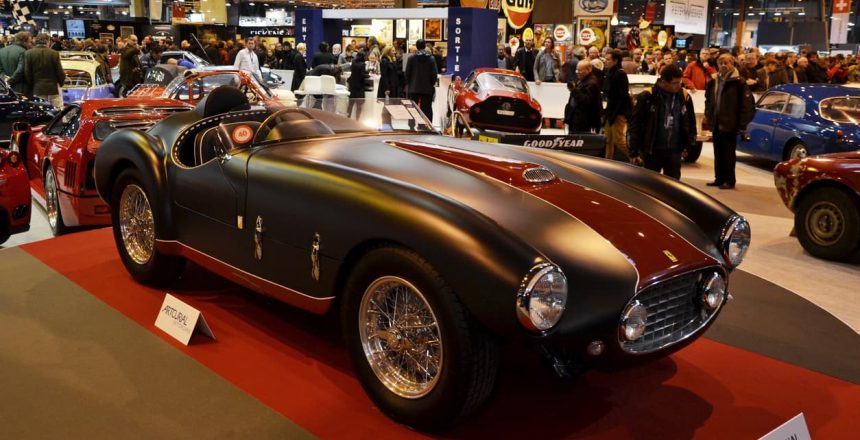Classic-car auctions are a great way to find rare vehicles, and following these tips will ensure you make the most of the experience.
Key takeaways
- Auctions provide access to cars not readily available on the market
- It’s easy to get carried away when bidding
- Being prepared before the day arrives can keep you on track
- Making transportation arrangements is also advisable
Whether you are an experienced classic-car collector or looking to buy your first, attending an auction provides access to vehicles you might not find anywhere else.
However, it’s easy to get carried away and turn what should be an exciting day into an overwhelming experience. Creating a plan before the auction and sticking to your strategy minimizes the chance of making mistakes when bidding.
Here are seven tips to keep in mind when buying a classic car at auction.
1) Do the research
The auction will offer multiple vehicles; don’t walk into the event unprepared. Fortunately, you can usually find the listings on the auction’s website in advance of the big day, making research manageable.
Start by determining the car type you want and narrow your search to a few vehicles. Read up on each automobile’s history using the vehicle-identification number (VIN). The VIN reveals if you’re bidding on an original, rebuild, or clone, and the car’s accident and maintenance history. Study vehicles’ recent auction prices, market values, and production numbers, and set a budget.
2) Remember your budget
Setting a budget before the auction makes it less likely you’ll overspend. You don’t want to bid blindly, so take the research you’ve completed to establish a fair price for the vehicles you wish to bid on at the auction.
Remember, most vehicles won’t come with guarantees or warranties, and there’s a chance repairs, restoration, or maintenance will be necessary before you can even drive it. As a result, your budget should be something you can comfortably afford, rather than every single penny you can spare
3) There could be extra costs
The amount you bid isn’t what you’ll end up paying; additional costs will almost surely add to the price tag. For instance, buyers’ surcharges, registration fees, and taxes will undoubtedly factor into the grand total. Make sure your budget incorporates these expenses.
The auction website will likely list fees you can expect to pay, so you won’t enter the situation blindly.
4) Auctions have unique terminology
Experienced auction buyers already know the terminology; if you’ve never attended an event before, learning these phrases will help:
- Reserve: The minimum price the seller will accept for the vehicle. This amount is usually hidden during bidding, but the auction is void if no one bids the reserve number. The seller could choose to waive the reserve amount and accept the final offer, which is a possibility if it’s close to the reserve.
- No reserve: When there’s no reserve on an auction, the highest bid wins. There will be a minimum starting bid associated with the auction, but the seller doesn’t have the right to void the auction if bids don’t reach a certain level.
- Double-ending: Avoid double-ending auctions unless you find a classic car you absolutely must have. The auction company collects commission from the buyer and the seller in these situations.
Some auctions don’t charge a buyer’s premium, which will keep costs down when buying a classic car.
5) Things won’t always follow your plan
Car auctions are full of variables, and it’s likely the day won’t go according to plan. For example, bidding on your first choice could get out of control to the point the cost exceeds the automobile’s value.
In these situations, it’s best to walk away and wait for another auction, or move on to your second choice. Overpaying for a car (or buying the wrong one) will cause regret, and it’s doubtful you’ll ever get your money back if you sell it.
6) Don’t forget insurance
Standard auto insurance isn’t good enough for rare classic cars; investigate insurance costs in advance find a carrier that will provide adequate coverage. You can even purchase specialized classic car insurance before you arrive at the auction to ensure you’re covered from the second you gain control of the vehicle.
Don’t be left scrambling to find insurance after winning an auction. Develop a clear plan to ensure you can smoothly assume ownership of the vehicle.
7) Shipping is safer than driving
Keeping your vehicle in excellent condition as you take it home is a priority. Remember that shipping the car is safer than driving it over long distances.
Car-shipping providers offer enclosed trailers that protect vehicles from road debris and the elements, limiting the chance of potential damage.
Make arrangements with your auto-transport vendor before the auction. This method works best when you’re confident you’ll walk away with a vehicle.
How to arrange car shipping
The easiest way to reserve a vehicle-transport carrier is with a broker. They will connect you with vetted service providers who can meet your unique transportation needs. They’ll also provide quotes before you choose a vendor.
Mercury Auto Transport is a car-shipping broker that can assist arranging transportation for any classic car you buy at auction. We’ll post your job on our network, where licensed and insured auto transport carriers can bid. Contact Mercury Auto Transport today to receive your auto-shipping quote.






